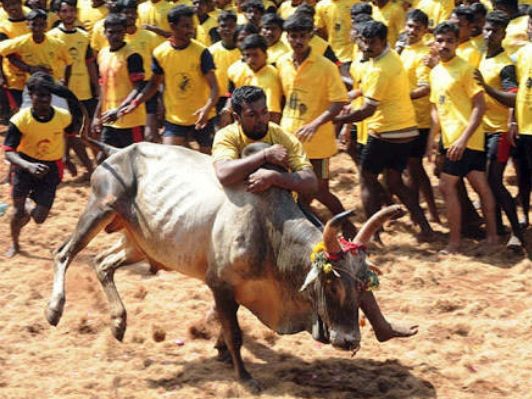Jallikattu Ban: A Controversial Verdict.
May 19, 2019 • 33 views

Jallikattu is a bull-taming festival in Tamilnadu. The Supreme Court banned the practice of Jallikattu in 2014. Since then there have been numerous controversies around it.
What is jallikattu?
Jallikattu is Tamil Nadu’s one of the most popular festivals which is celebrated at the time of the harvest festival of Pongal. It is considered auspicious and significant all across the state and people wait with enthusiastic breath for its arrival.
Basically, Jallikattu is a classic bull fight which involves a practice of men fighting with fierce bulls to tame them.
Origin of jallikattu.
The origin of the Jallikuttu goes back to ancient times when men used to practice fight against ferocious bulls to prove their physical strength. The one purpose of this display of strength was that men could woo prosperous women who would pick their partners from the lot. With the progression of time, the sport became popular as a conventional activity during harvest. The linguist origin of the word Jallikattu goes to the words ‘calli’ (coins) and ‘kattu’ (tie). This gives the meaning that a bundle of coins is tied to the bull’s horns.
In ancient times, the tamer fought to remove this bundle from the animal’s head to win gold or silver. He would be called ‘brave’ and ‘valourous’ and would also sometimes be rewarded with a bride.
What is the supreme court verdict?
The sport was organized as a tradition till May 2014. Then the Supreme Court of India banned the organization of Jallikattu from all performances where the bulls were involved. The Supreme Court cited issues related to animal welfare.
The government issued an order on January 8, 2016, exempting Jallikattu from all performances where bulls cannot be used. The Supreme Court’s judgment took a dramatic turn when in November 2016, the apex court dismissed the state government’s plea seeking review of its 2014 judgment.
After that, the use of bulls for Jallikattu events in Tamil Nadu was effectively banned. The Tamil Nadu government has now made fresh efforts seeking reinstatement of the ancient sport. The case is still under trail at the Supreme Court. This year, the date of Pongal fell on 14 and 15 January. The JalliKattu supporters managed to organize the event despite Supreme Court’s verdict.
Argument in support of ban.
The bench of the Supreme Court rejected any association or connection of Jallikattu with the right of freedom of religion in Article 25.The apex court observed that there was an apparent inconsistency and frontal collision between the Tamil Nadu Regulation of Jallikattu Act, 2009 and Article 25. The Animal Welfare Board of India (AWBI) mentioned unimaginable forms of tortures which are inflicted on the bull while the practice of bull taming.
The tortures involve tail twisting and fracturing, pouring chemicals into the eyes, mutilating ears, poking the animal by sharp-edged weapons, and intoxicants forced into its mouth.Tamil culture and tradition care for the wellbeing and welfare of the bull. The tradition and culture do not approve of infliction of any pain on the bull.
the tormented bull takes flight, a common symptom of stress, from the “vadi vaasal” (the chamber from which it comes out), it meets an abusive crowd which hooks on to it in dozens of petty prizes such as garments and utensils.By considering all these aspects, the Supreme Court stated that not only does Jallikattu inflict unnecessary pain and suffering on the animal and thereby violate the PCA Act.
Arguments against of ban.
The main argument which was cited against the ban of Jallikattu stated that Jallikattu is a festival that has the root in religion and Jallikattu is an event that takes place after harvest. It was argued that Jallikattu has religious flavor and such an ethos cannot be disregarded.
The argument given in the favor of Jallikattu by the supporters is that the practice of JalliKattu protects the native breed of the bulls from going to extinction. Because it is believed that tendencies which are practiced in the Jallikuttu are are naturally found in the bulls. There are five or six breeds of bulls which are only found in Tamilnadu. They are on the verge of extinction. Article 48 of the Indian constitution mandates thatthe state shall endeavor to protect and preserve any native breeds in the country.
It can be said that the Jallikattu debate is not only about animal welfare, but also about the institutional division of powers and responsibilities.
